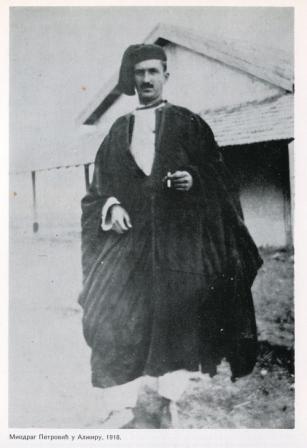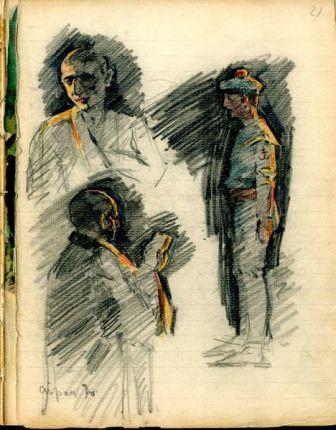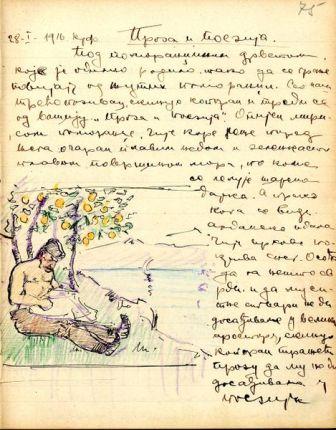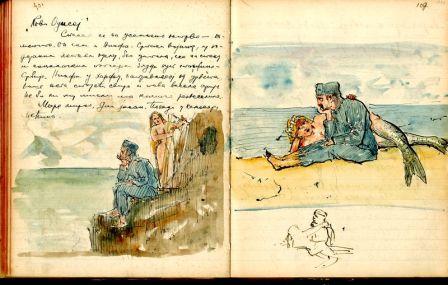The memory of World War I, its events and consequences, its victims and victors, remains very much alive today. It has become part of the individual and collective memory of Europe and of countries across the world – the stories of soldiers and their families continue to be told and published from generation to generation.
To mark the centenary of its outbreak in 2014, a consortium of national libraries and other partners from eight European countries that found themselves on different sides of the historic conflict made an unparalleled collection of more than 400,000 digitised items relating to World War I freely available to the public for the first time through Europeana.
As part of this project, the consortium members add a new blog post every month that looks at some of the stories behind just a few of these 400,000 images, starting with wonderful sketches and stories from a Serbian War Artist from the collections of the National Library of Serbia.
Stories of a Serbian War Artist
The National Library of Serbia is proud to present a remarkable piece from its World War One collection: a small, but powerful, story from amongst the material that we are digitising for the Europeana Collections 1914-18 project.

The three wonderful texts below are a compilation of writing accompanying sketches for future paintings by one of the official war artists of the Serbian army, Miodrag Petrović.
The artist was born in 1888 in the Kingdom of Serbia, where he began his art studies. Later on, he studied at the Arts Academy in Munich, Germany, until the beginning of the World War I.
After enlisting in the Serbian army, he was granted the status of the official military artist. He took part in the battles around Belgrade in 1914, and was part of the retreat with the army through Montenegro and Albania to the Greek island of Corfu during the winter of 1915. By the end of the war, he was stationed on the Salonika front, and in field hospitals in Tunisia and Algeria.
After the war Miodrag Petrović continued his art studies in Paris and enjoyed an accomplished and eminent artistic career. He died in 1950 in Belgrade.
1. A funeral on the hospital ship Divona
'The hospital ship Divona is transporting our wounded soldiers and officers, as well as the sick ones, to Bizerte. During our voyage on the Mediterranean sea, two of our soldiers have died. A wounded and a sick one. At eight o’clock in the evening they throw the two into the sea by moonlight.'

'Eight o’clock in the evening. The sky is clear, the moon is full. In the back part of the ship a two metre wide fence has been errected. At the very edge of the ship, with heads turned towards the ship and the legs towards the sea, the corpses are lying, both of them covered with the French flag. The colour red is near the sea, the white and blue away from it. The sea is of a dark greenish-blue colour. The sky is of the same colour – only brighter because of the moon, which cannot really be seen in the picture, but by its long reflection on the water. Its beams reaching the ship disperse into a thousand particles. The light bulbs are turned off in the back portion of the ship. There is only one shining on the right hand side. The ceremony begins. The ship’s (Protestant) priest in his black gown with a stole is turned toward the corpses and the sea. He is reading from the Bible in a low voice, almost silently.'
'Behind him there is the captain of the ship in a solemn, completely black uniform, bareheaded. To the left of him is another French officer and two ours, wounded in the arms. All of them bareheaded. There are two sailors to the right and two to the left of the corpses, all completely dressed in white, with caps on their heads (the sailors with blue around the head, a white mane, and a red tuft). Behind them, on both sides, our wounded and sick soldiers and two nurses all in white, with the Red Cross around their arms. The entire picture is illuminated by the bulb from the right, and the pale greenish-yellow light of the moon. The ship is white. The faces of all are solemn, sad. The priest is silently ending his prayer. The nurses are also whispering the Lord’s Prayer. “I’ve finished,” says the priest, turning to the captain and closing the Bible, and steps back.'
'The captain gives a sign that the motion be stopped. He approaches the corpses and makes a short speech: “Comrades, far from your homeland you breathed your last on the brotherly French boat. Go to the other world confident that your children, wives and parents will very soon live in freedom, in which you could not live. Farewell, comrades. Farewell. Farewell.” The captain ends the speech, and gives a sign that they be dropped. Two sailors come and lift one part of the board, and one of the corpses vanishes into the sea (there are 30 kilograms of iron attached to his legs). So does the other one. During the corpse’s fall into the water, one of the sailors blows loudly on a whistle. Our soldiers are quiet for no less than five minutes. They are silently looking at each other, the soldiers who buried so many comrades, who were wounded several times, who saw thousands of corpses; now this has such an impact on them that they are not able to utter a word.'

2. Prose and poetry
'Under an orange tree that has borne fruit plentifully, so that the branches are banding with yellow oranges, our soldier is sitting, with his coat taken off, removing lice from himself. Intoxicated by the smell of the orange whose peel is lying next to him, and enchanted with the blue sky and the greenish blue surface of the sea, upon which a colorful boat is rolling, while across the water one can see the Albanian coast, whose docks are covered with snow, he has itches; and in order that trifles should not bother him in these vast expanses, he takes off his coat- searching for prose so that it shouldn’t distract him from poetry.'

3. New Odysseus (Ulysses)
The boat was torpedoed by German submarines. Loaded with soldiers sailing from Bizerte in Africa to the Salonika Front, it sank. Some of the soldiers drowned, while some were saved by an English boat. Four of them, a Serb, a Senegalese, a French sailor and a foot soldier have saved themselves on a raft made from thick planks (which can be found in the upper part of any boat), clad in rags, starving, bluish through cold and thirst, in soldier’s summer tunics. They see a rocky coast in the distance. With happy faces, though exhausted, they are trying to paddle with their legs, using their last strength.

About a hundred metres from the coast the sea gets disturbed, and out of it emerge nymphs, Nereids, who surround the raft and start to pull it toward the coast, giggling hysterically. Others come out of the sea and go toward the rocks, laughing. The victims are pale, scared, confused. One of them is praying to God. He has saved himself on the solitary rocky island. He is alone with a nymph: the Serbian soldier, in torn summer clothes, with no shoes, sitting on a rock, with his look wandering toward the homeland, toward Serbia, and the nymph, standing behind him, playing a harp made of wood and singing cheerful melodies so as to cheer him up a little. The sea is calm, the day is clear. In the rocks behind there is a cave."
Сахрана на санитетској лађи Дивона
Санитетска лађа Дивона превози наше рањене војнике и официре, као и болесне, за Бизерт. За време вожње на Средоземном мору умиру два наша војника. Један рањеник и болесник. У осми час увече по месечини бацају обојицу у море. Осми час увече. Небо јасно, пун месец. На задњем делу лађе дигнута ограда у ширини око два метра. На саму ивицу лађе, тако да је глава окренута лађи, а ноге ка мору, положени лешеви. Оба леша покривена француском заставом. Црвена боја ка мору, бела на плаву ка лађи. Море затворено плаво-зелене боје. Небо исто – само отвореније, од месеца, који се на самој слици не види, пао дуги рефлекс по води. Крајњи зраци који додирују саму лађу разбијају се у хиљаду делића. На лађи у задњем делу угашене сијалице. Само остављена једна са десне стране. Свечаност почиње. Свештеник саме лађе (протестант) у црној ризи са петрахилом, окренут лешевима и мору. Чита јеванђеље тихо, готово у себи. Позади њега стоји капетан лађе у потпуно црном – свечаној униформи, гологлав. До њега, са леве стране, стоји још један француски официр, и два наша, рањена у рује. Сви гологлави.
Са десне и леве стране лешева по два матроза у потпуно белом оделу са капама на глави (матроским плавим око главе, белом гривом и црвеном ћубом). Са обе стране иза њих наши рањени и болесни војници и две милосрдне сестре све у белом, са црвеним крстовима око руке. Целу слику осветљава сијалица са десне стране и бледа зеленкастожута светлост месеца. Лађа обојена бело. Лица свих свечана, тужна.. Свештеник довршава тихо своју молитву. Милостиве сестре такође шапћући читају Оченаш. „Свршио сам, извол’те“, рече свештеник, окрећући се капетану и затварајући Свето писмо, и одступи назада. Капетан да знак да се точак заустави. Приђе лешевима и кратко изговори: „Другови, далеко од своје отаджбине испустисте душе на братском француском борду. Пођите са уверењем на онај свет да ће ваша деца, жене и родитељи за кратко време дочекати слободу, коју ви нисте могли дочекати. Збогом, другови. Збогом. Збогом.“ Заврши капетан и руком да знак за спуштање. Са стране два матроза приђоше, дигоше један крај даске, и леш слете у море (за ноге му је привезано 30 килограма гвожђа). Тако и други. За време док леш дижу и пада ка води, један од матроза пишти јако у пиштаљку. Наши војници осташе запрепашћени читавих пет минута. Немо се погледаше. Војници који су масу својих другова закопали, били рањавани по неколико пута, гледали хиљадама лешева, сад нису умели да дођу до речи – толико је то на њих страшно дејствовало.
Проза и поезија Под поморанџиним дрветом које је обилно родило, тако да се гране повијају од жутих поморанџи, сео наш трећепозивац, скинуо капоран и треби се од вашију. Опијен мирисом поморанџе чије коре леже поред њега, очаран плавим небом и зеленкасто-плавом површином мора, по коме се лелуја шарена барка, а преко мора се види албанска обала, чије докове покрива снег, осећа да га нешто сврби. И да му ситне ствари не би досађивале у великим просторима, скину капоран, тражећи прозу да му не би досађивала у поезији. Нови Одисеј (Улис) Лађа је торпедована од немачких сумарена. Велика натоварена људствост, војницима који из Бизерта, Африке, иду за Солунски фронт, потпнула. Неки су се од војника подавили, неке је спасио енглески тарпинер. Њих четворица – Србин, Сенегалац, француски маринац и пешак – спасли су се на једном сплаву направљеном од дебелих дасака (од којих свака лађа има на крову), исцепани, изгладнели, помодрели ид зиме и жеђи, у лаким летњим војничким блузама. У даљини се види каменита обала. Весала лица, иако уморни, покушавају да ногама веслају прикупљајући и последњу снагу. До саме обале на сто метара вода се узбурка и из ње искочише нимфе – нерајаиде, опколише сплав и у хистеричном кикоту почеше га вући ка обали. Друге искочише из мора ка камењу и смеју се. Страдалници бледи, уплашени, збуњени. Један се моли Богу. Спасао се на усамљено острво каменито. Он сам и нимфа. Српски војник, у подерано летњем оделу, без ципела, сео на стену и сањалачким погледом блуди пут отаџбине – Србије. Нимфа у харфу, направљеној од дрвета, више њега стојећи, свира и пева веселе арије не би ли му мисли ма колико развеселила. Море мирно, дан јасан. Позади у камењару пећина.


